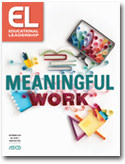Recently, I asked a few parents to tell me about their child's most meaningful schoolwork. I soon had more than a few projects to look at on my desk.
For her science fair project, Bay, 12, whose interests are people and animals, made a YouTube video re-creating the famous marshmallow psychology experiment. She enticed several neighborhood 4-year-olds—and her cat—to practice their self-restraint (or not) by promising them they could have two marshmallows later if they succeeded in not eating the first while she was out of the room. Her camera, which she hid in a shoebox, caught them in action, and the result was an amusing insight into kids' behaviors—ignoring, licking, or gobbling, and, in the case of the cat, stalking, the marshmallow.
Not all of the student work required that much orchestration. Riley, 7, wrote a journal when she visited North Carolina's Outer Banks with her family. Every night she talked over with her parents what she might draw or write about the fun at the beach that day. "It was something we looked forward to each evening. … We created memories that will last a lifetime," her mom says.
Kendall, 8, created a bound book that followed a rubric, in which she described such events as the time she got a puppy and her feelings about not getting any of the presents at a birthday bash. "Not only has it increased her interest in writing, but it's also gotten her reading more books because she considers herself an author," her dad says. "She also now reads the back flap 'about the author' page in all the books she reads."
All the pieces of student work elicited delighted surprise from the proud parents. "It didn't seem like work to them—it seemed like fun," was a frequent comment.
These parents' experiences tie in with the research about authentic learning in this issue—which suggests that purpose, relevance, student choice, and ownership are the keys to making learning meaningful. San Francisco teacher Dan Meyer, whose blog has attracted much response from teachers and students (see why at http://blog.mrmeyer.com/?p=6548), has found an exciting way to encourage his high school math students to become "patient problem solvers." Observing that the textbook style of teaching math problems—present the problem, show the formula, do the computations—rarely creates enthusiastic learners who remember the math, Dan strips a textbook problem down to the "shortest possible question." In his videos—he's often out shooting such interesting occurrences as the interval times for traffic lights and the time it takes a shopper to check out groceries—he presents what our authors John Larmer and John R. Morgendoller (p. 34) call a "point of entry."
For example, one video shows a water tank slowly filling. "How long does it take to fill it up?" he asks, giving no other information. Alarmed that they might have to watch the entire video to find out, his students begin asking all kinds of questions about how to solve the problem. He's got them hooked. Dan's advice: "Use multimedia, encourage student interaction, ask the shortest question you can, let students build the problem, and be less helpful."
When parents—and, for that matter, educators—talk about student work, two seemingly conflicting ideas enter the conversation. The first is that kids need more rigorous and meaningful work. The other is that kids need less work for the sake of work, and more time for authentic learning.
Our authors in this issue discuss this debate and more—for example, how much and what kind of practice kids need to master a skill or concept (p. 10); what motivates students to attempt a challenge (p. 16); what kind of feedback encourages more effort (pp. 16, 22); and how much choice is really helpful (pp. 68, 80). Some of our authors describe how to improve learning inside school—for example, how to differentiate math tasks (p. 28); make a literature circle more engaging (p. 50); or plan homework more purposefully (pp. 10, 74). Others illustrate how to introduce real-world problems to students through internships (p. 44) and local learning (pp. 38, 55, 64). Additional articles online also enrich our theme. See pages 2, 3, and 5 for the complete lineup.
As you can see, this summer, the ELstaff has been working with new columnists, executing a new design, and planning several changes that bring more research and more reader interaction to our pages. We found our work both meaningful and fun—and hope you find your professional learning just as rewarding.
P.S. Visit us on social media and tell us what you'd like to see in EL.
<P ID="scherer-audio">add audio here <!--** for vcm ** --><!-- Start of Brightcove Player --><!--div style="display:none"></div--><!--By use of this code snippet, I agree to the Brightcove Publisher T and C found at https://accounts.brightcove.com/en/terms-and-conditions/. --><!--script type="text/javascript" src="http://admin.brightcove.com/js/BrightcoveExperiences.js"></script--><!--<object id="myExperience590113149001" class="BrightcoveExperience"><param name="bgcolor" value="#FFFFFF" /><param name="width" value="425" /><param name="height" value="430" /><param name="playerID" value="47884069001" /><param name="playerKey" value="AQ%2E%2E,AAAAAmGjiRE%2E,escbD3Me8-wNwVrrLtP1hZJzLSzWzxGl" /><param name="isVid" value="true" /><param name="dynamicStreaming" value="true" /> <param name="@videoPlayer" value="590113149001" /></object>--><!-- End of Brightcove Player --><!--** for html **<object id="flashObj" width="486" height="412" classid="clsid:D27CDB6E-AE6D-11cf-96B8-444553540000" codebase="http://download.macromedia.com/pub/shockwave/cabs/flash/swflash.cab#version=9,0,47,0"><param name="movie" value="http://c.brightcove.com/services/viewer/federated_f9?isVid=1" /><param name="bgcolor" value="#FFFFFF" /><param name="flashVars" value="videoId=590113149001&playerID=11490813001&playerKey=AQ~~,AAAAAmGjiRE~,escbD3Me8-zfW2J4SI2ZSHPsqtup23tT&domain=embed&dynamicStreaming=true" /><param name="base" value="http://admin.brightcove.com" /><param name="seamlesstabbing" value="false" /><param name="allowFullScreen" value="true" /><param name="swLiveConnect" value="true" /><param name="allowScriptAccess" value="always" /><embed src="http://c.brightcove.com/services/viewer/federated_f9?isVid=1" bgcolor="#FFFFFF" flashVars="videoId=590113149001&playerID=11490813001&playerKey=AQ~~,AAAAAmGjiRE~,escbD3Me8-zfW2J4SI2ZSHPsqtup23tT&domain=embed&dynamicStreaming=true" base="http://admin.brightcove.com" name="flashObj" width="486" height="412" seamlesstabbing="false" type="application/x-shockwave-flash" allowFullScreen="true" swLiveConnect="true" allowScriptAccess="always" pluginspage="http://www.macromedia.com/shockwave/download/index.cgi?P1_Prod_Version=ShockwaveFlash"></embed></object>-->







